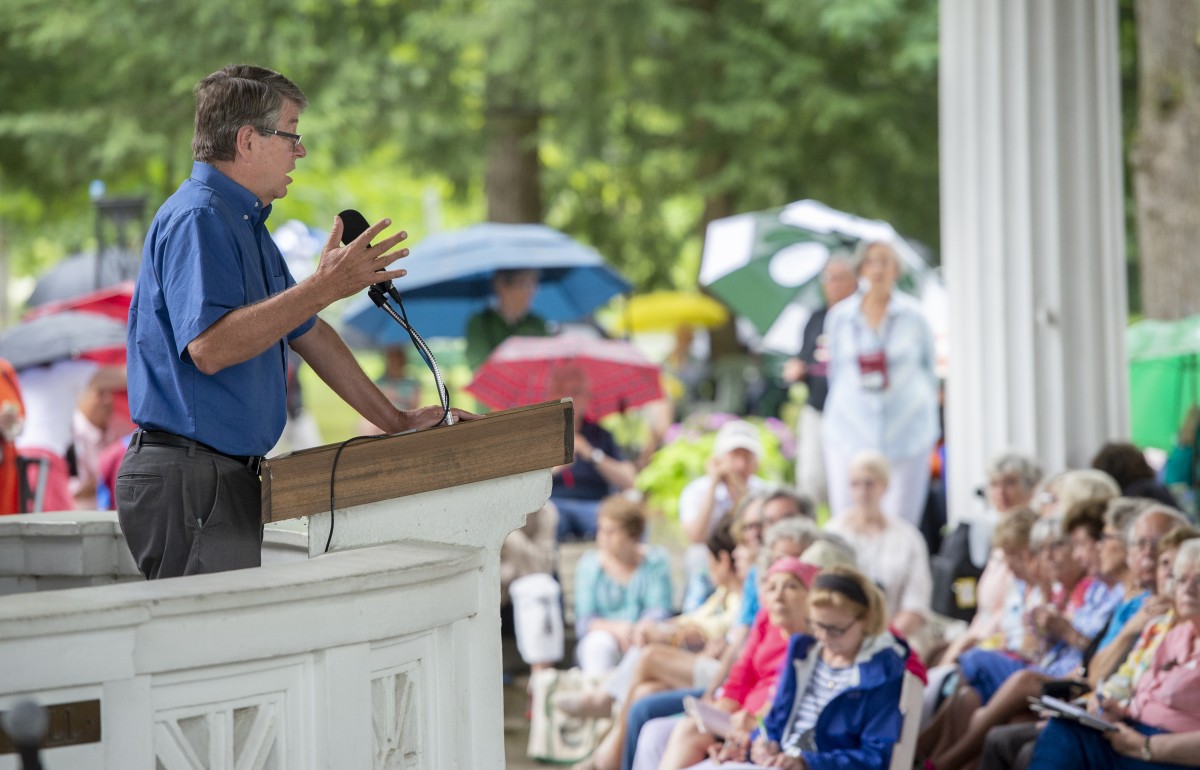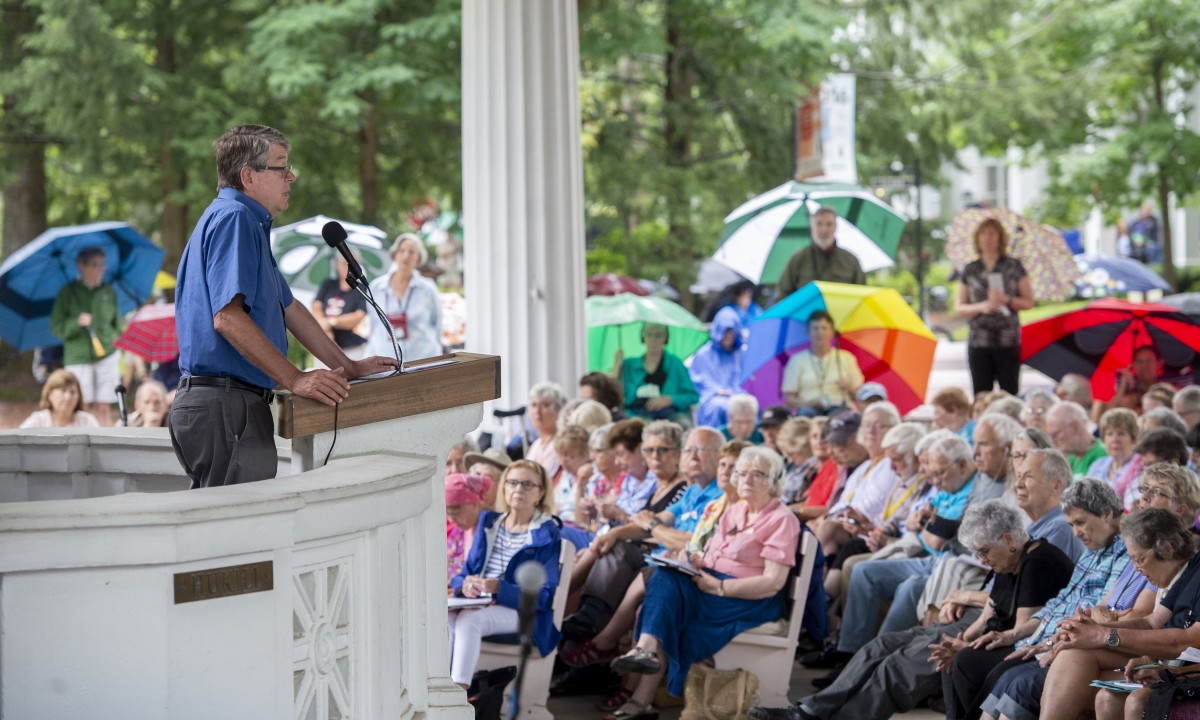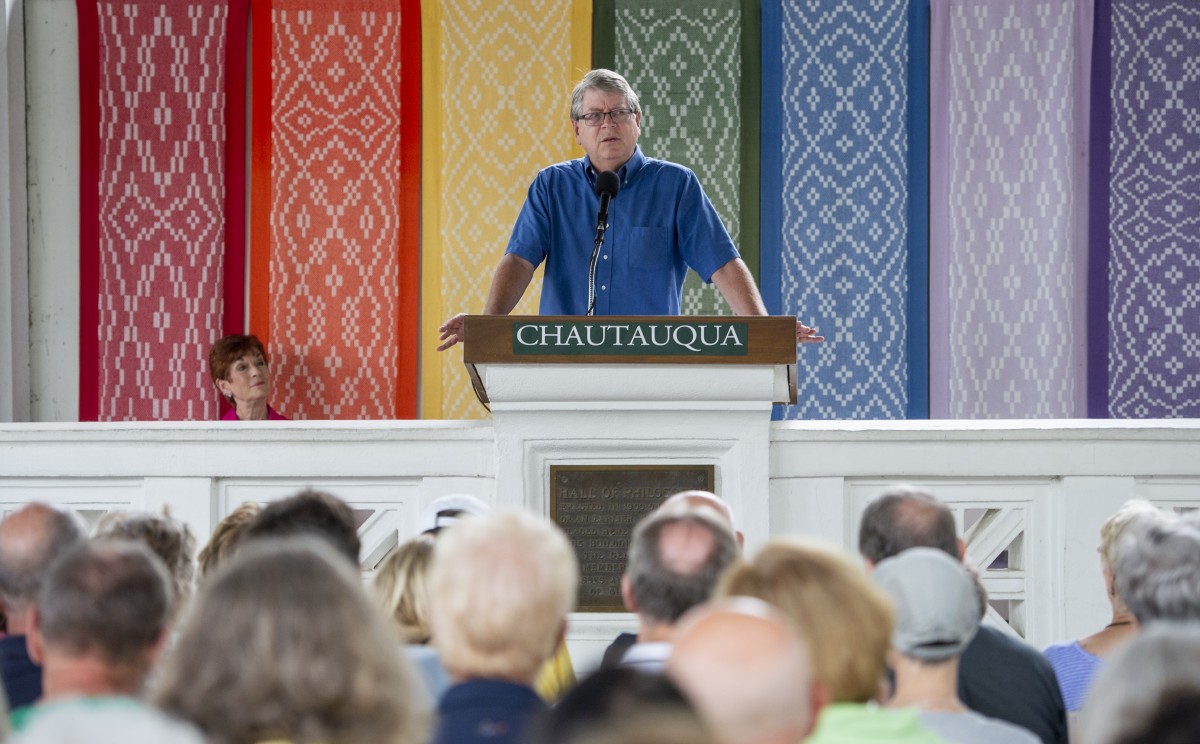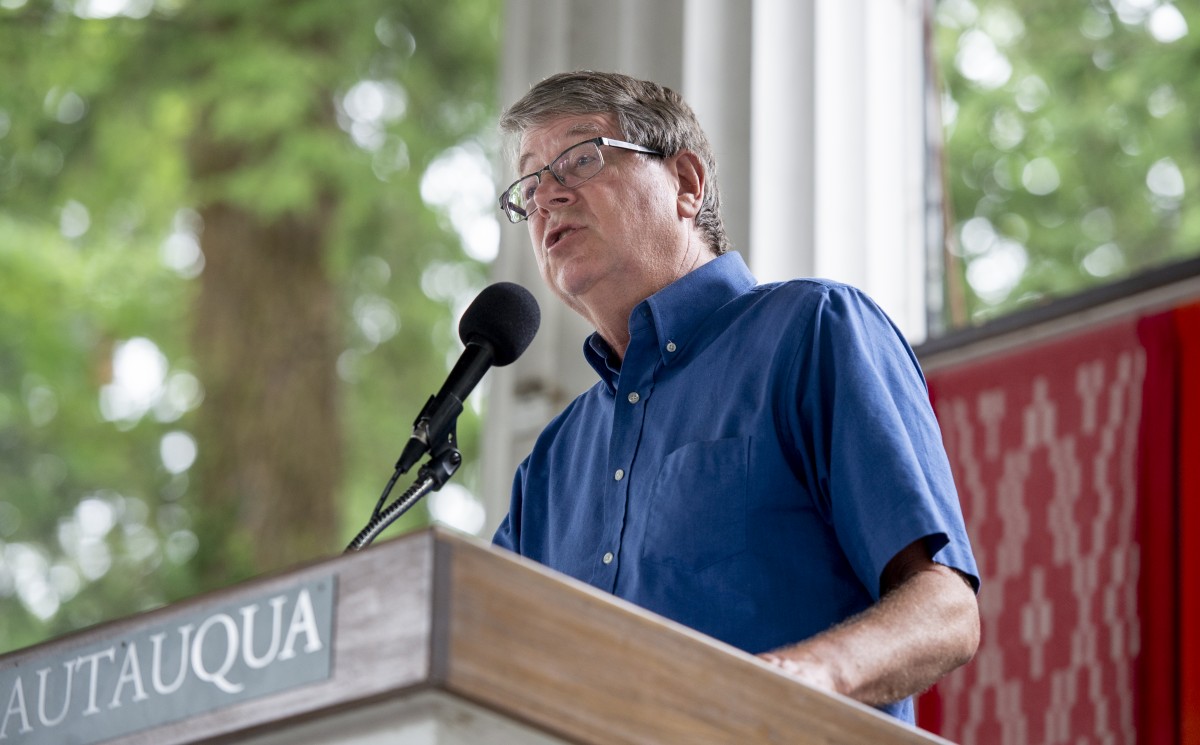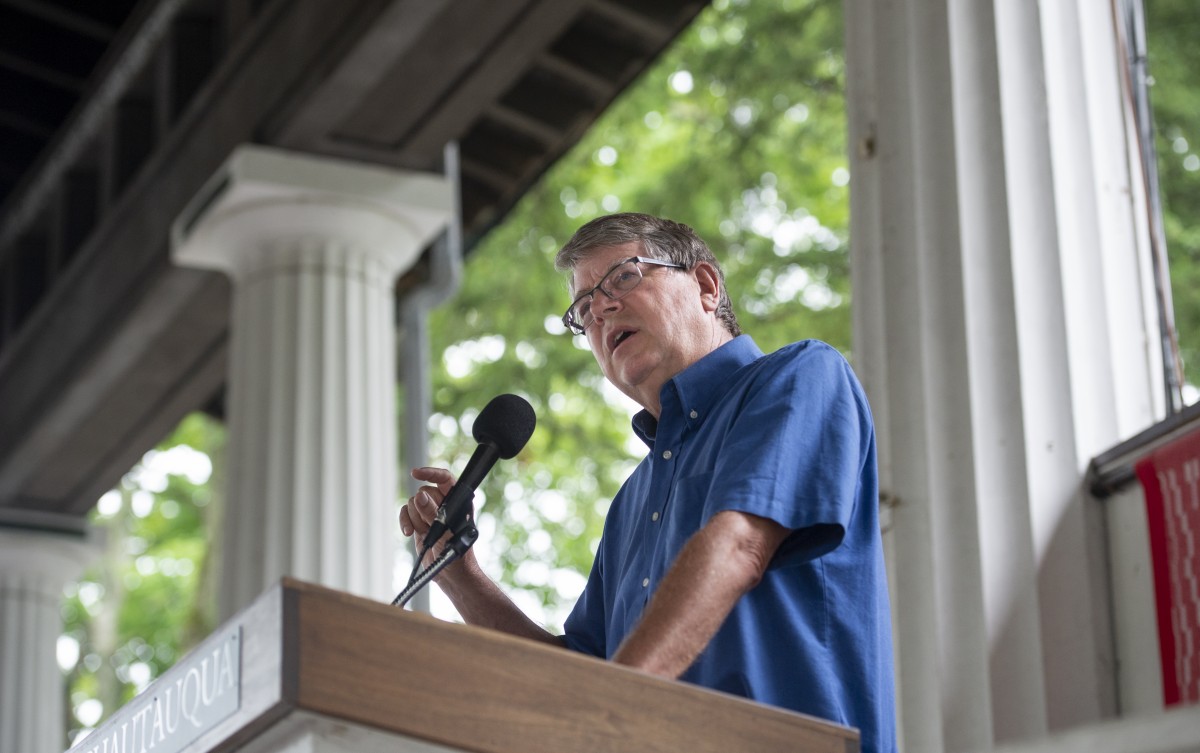A 30-second conversation in a Colorado cake shop sparked six years of constitutional debate on local, state and national levels.
Although even the Supreme Court has now declared a definitive stance in Masterpiece Cakeshop v. Colorado Civil Rights Commission, Steven Smith still doesn’t believe there is any legal action that can crown either side completely victorious.
At 2 p.m. Tuesday, August 7, in the Hall of Philosophy, Smith, the University of San Diego Warren Distinguished Professor of Law, gave his lecture, “The Cake Artist and the ‘Fixed Star in Our Constitutional Constellation,’ ” as part of Week Seven’s interfaith theme, “Let Them Eat Cake? Defining the Future of Religious Freedom in the U.S.”
Masterpiece Cakeshop v. Colorado Civil Rights Commission consisted of three central figures: Jack Phillips, Charlie Craig and David Mullins.
First was Phillips, the owner of Masterpiece Cakeshop in Lakewood, Colorado.
“(Phillips) describes himself as a cake artist, and in this case that is not just over-promotion or puffing — he actually did study art and sculpture as a young man and decided early in his career that his artistic medium was going to be baked goods,” Smith said.
In addition to being an artist, Phillips is also a devout Christian.
“He believes that he should serve God in all aspects of his life and in particular, (prioritizes it) in his business,” Smith said.
Due to his decision to integrate his faith into his work, Smith said Phillips has declined many orders over the course of his career that express messages “contrary to what he believes to be God’s will.”
“He won’t make a cake that expresses an anti-American message, a racist message, and he has apparently turned down business for Halloween cakes because in his particular interpretation of Christianity, he sees inconsistencies there,” Smith said.
In addition to his other exclusions, Phillips has refused to make cakes for same-sex weddings on multiple occasions because he believes God’s will is the marriage between a man and a woman, Smith said.
Craig and Mullins are a same-sex couple whose businesss Phillips declined in July 2012.
Same-sex marriage was not yet legal in Colorado, so the couple planned to have their wedding in Massachusetts and return to Colorado for a celebratory reception. When they asked Phillips for a wedding cake, he said he could not make it based on his religious beliefs, but would make and sell them any other baked goods. Craig and Mullins promptly left without discussing any details of their wedding cake.
The following day, Craig’s mother called Phillips, and he told her the same information.
Craig and Mullins proceeded to file a complaint with the Colorado Civil Rights Commision.
“They argued that Phillips violated Colorado’s anti-discrimination act, which, among other things, prohibits discrimination in public accomodations on grounds of race, sex and sexual orientation, the prominent criteria here,” Smith said.
Phillips responded to the complaint, saying he had not violated the statute because he did not decline the cake based on the sexual orientation of the couple and raised a First Amendment defense.
In response to Phillip’s First Amendment argument, Smith posed a question: What does the free exercise of religion, guaranteed by the U.S. Constitution, mean?
Smith said the concepts of accommodation and neutrality have answered that question through the course of “all constitutional tradition.”
Accommodation is the idea that government should try to make room, whenever possible, for people to live in accordance with their religious beliefs, Smith said.
On the other hand, neutrality is the idea that government does not have any obligation to accommodate religion, but it “should not target, persecute or discriminate against it.”
For three decades in the second half of the 20th century, the official position of the Supreme Court was that the Free Exercise Clause requires accommodation.
“If somebody’s religion was being burdened by a law, they should be exempted of it unless the government has a compelling argument in requiring them to comply and can’t alter it in a less constrictive way,” Smith said.
However, in 1990, the court repudiated accommodation in favor of neutrality.
“The court said that as long as a law is religiously neutral and generally applicable, no accommodation of religion is constitutionally required,” Smith said.
According to Smith, the decision to switch to neutrality was seen as a “significant cutback” in the protection of religious freedom.
“At the time, it was almost universally denounced across the political spectrum,” he said.
Eventually, Congress passed the Religious Freedom Restoration Act, which re-imposed the accommodation requirement.
However, in the Masterpiece case, RFRA did not apply because the law that was allegedly violated was on the state level, not the federal.
“On that standard, the Colorado judges quite quickly dismissed Phillips’ free exercise objections,” Smith said. “They said the Colorado Anti-Discrimination Act is religiously neutral; it is not targeting religion.”
Smith then moved on to what he calls “the constitutional heart” of the case — the free speech or “no compelled affirmations” issue.
Smith believes the best example of this issue is the 1943 case West Virginia State Board of Education v. Barnette.
In 1942, the West Virginia Board of Education required public schools to make saluting the flag a mandatory part of school activities. Children from a family of Jehovah’s Witnesses refused to perform the salute and were sent home from school for noncompliance. In a 6-to-3 decision, the Supreme Court overruled its decision in a previous case and ruled that compelling public schoolchildren to salute the flag was unconstitutional.
Smith quoted what he considers to be the “most eloquent statement in the case”:
“If there is any fixed star in our constitutional constellation, it is that no official, high or petty, can prescribe what shall be orthodox in politics, nationalism, religion, or other matters of opinion or force citizens to confess by word or act their faith therein.”
Smith now calls that quote the “Barnette principle,” standing for the proposition that freedom of speech means the freedom not to speak.
Historically, Smith thinks the principle is important because people in positions of power have shown a tendency to want others to affirm their controversial beliefs. He believes this form of affirmation threatens freedom of conscience more than any other act of speech.
“Being compelled to affirm something that you don’t believe, I think, is more of an invasion on our personal integrity and conscience than being told you can’t say certain things you want to say,” he said.
The Barnette principle applies to Masterpiece in two ways.
First is the “expressive conduct” approach.
“The basic idea behind this approach is that speech or expression can’t be limited to spoken or written words,” Smith said. “Freedom of expression has to include symbolic or expressive conduct like art or burning a flag.”
However, freedom of expression can’t include all forms of conduct, so the conduct being regulated has to be examined to determine how expressive the underlying message is.
“If we take that approach, then the question in the Masterpiece case is something like, ‘Is the wedding cake really expressive?’ ” he said. “Some would say no, the cake is just meant to be eaten.”
Smith said with differing characterizations of what both conduct and expression mean, many First Amendment theorists are skeptical of this approach.
The second approach is “government purpose.”
“If we think the Free Speech Clause is supposed to be a force against government censorship, then it might be that what we care about is not so much whether the conduct is expressive or not, but rather whether the government’s purpose in regulating it is because the government is concerned with the content of what it is regulating,” Smith said.
Smith said if that is the government’s concern, then the First Amendment is “implicated.” If it is not, then free speech is “not implicated,” even if it is clear that expression is involved.
Smith believes this approach does not apply to Masterpiece on the basis of anti-discrimination laws.
“I believe that general anti-discrimination laws are intended to prevent deprivation from goods, services and opportunities,” he said. “These laws are not concerned with any expression.”
In wedding vendor cases like Masterpiece, this does not apply because the complainants alleged little to no material injury.
“In (the Masterpiece case), another baker promptly made a cake for Craig and Mullins, and so they did not claim any damages for the deprivation of a cake,” Smith said.
Instead of material damages, Smith said Masterpiece focuses more on “dignitary harms.”
“The argument is that the refusal of service sends a message that is insulting or humiliating,” Smith said.
However, Smith said people fail to realize that the dignitary harm falls on Phillips more so than Craig and Mullins.
“Not only has the law condemned his particular belief, but he is being required to act contrary … to something that is core in his life,” Smith said.
Smith believes there are strong constitutional arguments in favor of both Phillips and Craig and Mullins. So instead of picking sides, Smith wants people to work toward creating communities where no one is discriminated against based on race, sex, sexual orientation or even religious beliefs.
“I hope we are going to be able to find some way to have a community that is inclusive enough that we can allow (all) people to participate in public life without having to closet, hide or bracket their beliefs,” he said.


